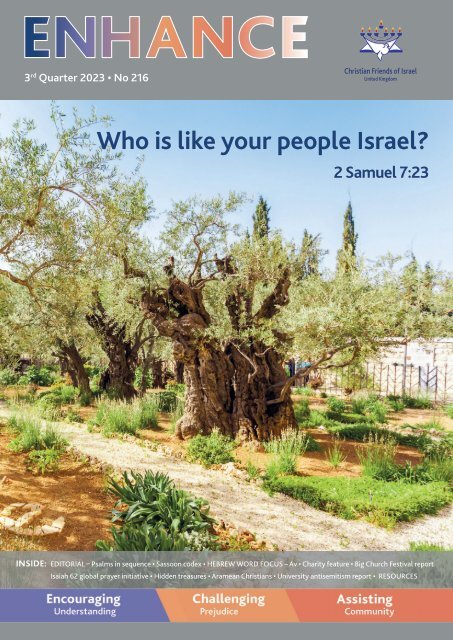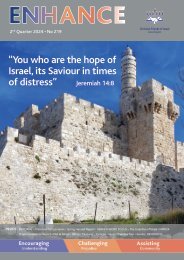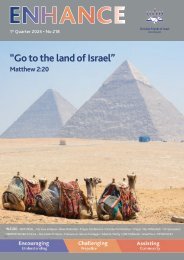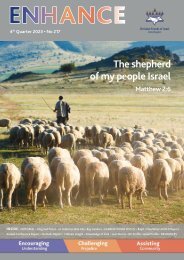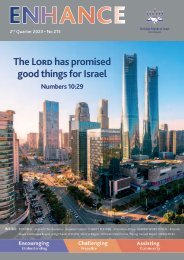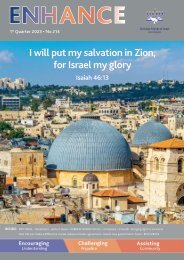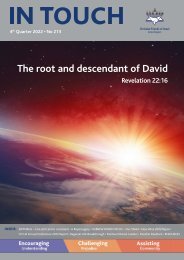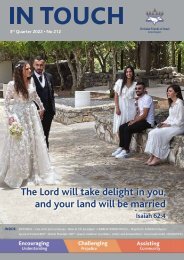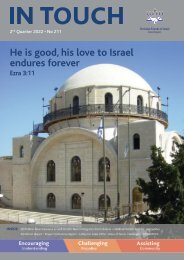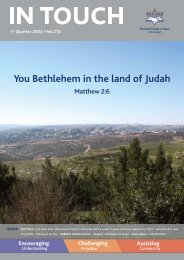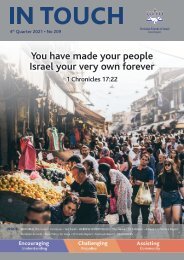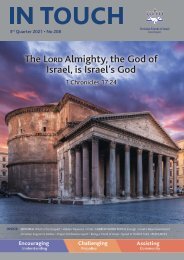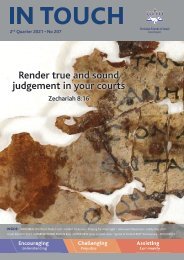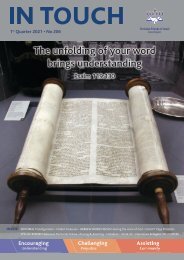ENHANCE - 3rd Quarter 2023
The third quarter magazine from Christian Friends of Israel UK, with articles on the Psalms, the Hebrew word 'Av', the Codex Sassoon and United Hatzalah.
The third quarter magazine from Christian Friends of Israel UK, with articles on the Psalms, the Hebrew word 'Av', the Codex Sassoon and United Hatzalah.
You also want an ePaper? Increase the reach of your titles
YUMPU automatically turns print PDFs into web optimized ePapers that Google loves.
3 rd <strong>Quarter</strong> <strong>2023</strong> • No 216<br />
Christian Friends of Israel<br />
United Kingdom<br />
Who is like your people Israel?<br />
2 Samuel 7:23<br />
INSIDE: EDITORIAL – Psalms in sequence • Sassoon codex • HEBREW WORD FOCUS – Av • Charity feature • Big Church Festival report<br />
Isaiah 62 global prayer initiative • Hidden treasures • Aramean Christians • University antisemitism report • RESOURCES
Editorial<br />
Christian Friends of Israel<br />
United Kingdom<br />
About us<br />
CFI UK seeks to bless Israel through<br />
practical and moral support, and serve<br />
the Church in teaching about God’s<br />
purposes for Israel and the Hebrew<br />
heritage of our faith.<br />
CFI UK also produce a monthly prayer<br />
letter, a weekly audio Middle East report<br />
and distribute Haverim teaching.<br />
Please contact us for full details of<br />
projects in Israel and the teaching<br />
resources available.<br />
As an educational charity, we carry a<br />
variety of resources relevant to our<br />
purpose. We do not necessarily endorse<br />
every view expressed by our guest<br />
writers or authors.<br />
Encouraging understanding in the<br />
Church of Israel in context of the<br />
Bible, history and today.<br />
Challenging prejudice against Israel<br />
and antisemitism alongside the Jewish<br />
community in the UK.<br />
Assisting cross-culturally in Israel<br />
with charitable projects - medical,<br />
educational and social.<br />
What’s in a name?<br />
<strong>ENHANCE</strong> means to increase, or further<br />
improve the quality, value, or extent<br />
of, in our instance, Christian friendship<br />
of Israel. It also emphasises that when<br />
God’s faithfulness to Israel is included<br />
and understood by the wider Church, it<br />
truly is ‘faith enhancing.’<br />
<strong>ENHANCE</strong> Magazine<br />
Published by:<br />
CFI Charitable Trust, PO Box 2687<br />
Eastbourne BN22 7LZ<br />
Tel: 01323 410 810<br />
Email: info@cfi.org.uk<br />
www.cfi.org.uk<br />
Registered Charity, No. 1101899<br />
Registered Office c/o<br />
Caladine, Chantry House, 22 Upperton Road<br />
Eastbourne, BN21 1BF<br />
Company No: 04984515<br />
VAT Registration No: GB678780275<br />
Front cover photo:<br />
Olive Trees at Gethsemane<br />
Jacob Vince<br />
Psalms in sequence<br />
Passover<br />
113 –118<br />
According to Jesus, the<br />
third part of the Bible<br />
begins with and is<br />
named after the Psalms<br />
(see Luke 24:44).<br />
As the Psalms were collected,<br />
they were formed into five books,<br />
replicating the five books of Moses.<br />
The first two books of Psalms<br />
are attributed to David, although<br />
important Psalms in the later<br />
books also bear his name. Unlike<br />
the headings of passages inserted<br />
in most Bibles – some useful,<br />
others downright misleading – the<br />
headings for individual Psalms are<br />
part of the text itself and should be<br />
read as such.<br />
As the name for the third part of<br />
the Bible, Psalms includes poetical<br />
and proverbial texts, it concludes<br />
with the historical books of Esther,<br />
Daniel, Ezra, Nehemiah and the<br />
summary book Chronicles, which<br />
interestingly reproduces sections<br />
from the Psalms as well as other<br />
books in Bible. Repetitions in<br />
Scripture are an important means of<br />
emphasising particular truths.<br />
As the Scriptures unfold there are<br />
often summaries, with Chronicles<br />
the supreme summary of the<br />
first three parts of the Bible (Law,<br />
Prophets, Psalms) commencing with<br />
Adam in creation and concluding<br />
with Israel going up to Jerusalem<br />
after exile. Similarly, John’s<br />
gospel is a summary of the whole<br />
Bible (Law, Prophets Psalms, and<br />
Apostles) commencing with Jesus’<br />
existence “in the beginning” (John<br />
1:1) and concluding with his second<br />
coming, twice repeating the phrase,<br />
“until I return” (John 21:21-23).<br />
Within the Psalms, all five books<br />
end with psalms of praise, the final<br />
one, Book Five, ending with five<br />
psalms of praise to God, 146-150,<br />
Psalm 150 being the supreme psalm<br />
of praise, with hardly sufficient<br />
instruments by its close.<br />
Law<br />
119<br />
Ascent<br />
120 –134<br />
So, they are clearly set out in a<br />
particular order. Indeed, within<br />
the apostles’ teaching there is an<br />
indication that the arrangement<br />
of the Psalms into a particular<br />
sequence was known at that time,<br />
seen in one of Paul’s references,<br />
“As it is written in the second Psalm”<br />
(Acts 13:33). We may infer from<br />
this that there was certainly a first<br />
Psalm and given the nature of what<br />
is today known as the first Psalm,<br />
it is difficult to identify a better<br />
candidate with which to begin them.<br />
Reading through the Psalms in<br />
order, and focusing on their use<br />
in a Jewish feast, we find those<br />
read at the service of Passover<br />
numbered Psalms 113-118. Next<br />
in sequence is Psalm 119, which<br />
apart from being the longest, is set<br />
out acrostically with its twenty-two<br />
stanzas representing the twentytwo<br />
Hebrew letters of the alphabet,<br />
aleph to tav (or A-Z).<br />
A similar memory technique is<br />
used in Psalm 145 with its twentytwo<br />
stanzas. An indication of its<br />
memorability is seen in the Book<br />
of Daniel where Nebuchadnezzar<br />
quotes from it as he recognizes the<br />
living God of heaven and earth (see<br />
Daniel 4:34 quoting Psalm 145:13).<br />
However, the important aspect<br />
of Psalm 119 is its entire focus<br />
on the word of God, hence every<br />
letter arranged to form twentytwo<br />
dividers. Prominent are<br />
synonyms for the ‘word,’ such as<br />
‘law’, ‘statutes’, ‘precepts’, ‘decrees’,<br />
found within virtually every<br />
sentence of the poem. After Psalm<br />
119 come the Psalms of Ascent,<br />
titled as such within the text and<br />
numbered Psalms 120-134.<br />
If we look at the sequence of this set<br />
of Psalms, we discover that Psalms<br />
113-118 recall the rescue from Egypt<br />
at Passover, Psalm 119 the law the<br />
Israelites received in the desert after<br />
leaving Egypt and Psalms 120-134<br />
their travelling towards the ascent to<br />
2 <strong>ENHANCE</strong> • 3 rd <strong>Quarter</strong> <strong>2023</strong>
The Sassoon codex<br />
“I bought the Sassoon Codex for the<br />
Jewish people, not for me” Alfred Moses<br />
The former US ambassador to Romania bought the most expensive book ever sold<br />
and then donated it to a Jewish museum in Tel Aviv.<br />
Rabbinic tradition says that<br />
the Israelites accepted the<br />
law given to Moses (the<br />
Torah) before seeing it. So, it<br />
is fortuitous that Alfred Moses<br />
bought the most expensive book<br />
ever sold at auction – a Hebrew<br />
bible – before he saw it.<br />
“I wasn’t expecting such a sturdy<br />
book,” Alfred said, a little more than<br />
24 hours after he saw the Sassoon<br />
Codex for the first time at Sotheby’s<br />
in New York, where he bought it for<br />
$38.1 million.<br />
“It’s quite readable, which I had not<br />
expected, and can actually be touched<br />
and handled. As precious as it is, being<br />
over 1,000 years old, it’s in remarkably<br />
good physical condition,” he said.<br />
Alfred read from the Ten Commandments<br />
in Deuteronomy in the<br />
manuscript without touching the<br />
pages, “I would have been afraid to do<br />
that,” he said.<br />
All looked good to him in the text<br />
from Deuteronomy. “If there are<br />
mistakes, I’m not knowledgeable<br />
enough to have picked them up,” he<br />
said, laughing – he is fluent in Hebrew<br />
and has a home in Israel.<br />
“I was enormously pleased to be able<br />
to acquire it for ANU (The Musuem<br />
of the Jewish People). I bought the<br />
Sassoon Codex for the Jewish people,<br />
not for me. It will be on display in<br />
Israel,” he added.<br />
The ‘bedrock’ of Jewish civilization<br />
When Alfred read the Ten<br />
Commandments from the manuscript<br />
for the first time in New York, the<br />
experience made an impression on<br />
him because of the book’s history<br />
rather than its religious nature.<br />
“This is the bedrock of our Jewish<br />
civilization. Without the Tanakh, we<br />
would be like the other people of the<br />
world and have disappeared,” he said.<br />
“In a sense, it’s the glue that has kept<br />
us together. Without this, there’d be<br />
nothing.”<br />
“I wanted this to be in a Jewish<br />
museum in Israel. Israel is a Jewish<br />
state. Hundreds of thousands, if not<br />
millions, of Jews from all over the<br />
world go to Israel to visit. They will<br />
see it there and take pride in being<br />
Jewish,” he said.<br />
That narrowed the options down<br />
to the Israel Museum, the National<br />
Library and ANU. “I’m active in ANU.<br />
Alfred Moses with Codex Sassoon.<br />
Credit: courtesy of Sotheby’s<br />
I thought it was right to go to the<br />
Museum of the Jewish people. The<br />
Sassoon Codex should belong to the<br />
Jewish people,” he said.<br />
Since the manuscript was written<br />
either in Syria or Tiberias, the book is<br />
headed to Israel for “a homecoming,”<br />
according to Alfred. “It will be in the<br />
ancestral home of the Jewish people.”<br />
He hopes that Jews who see the<br />
manuscript will think: “We are part of<br />
a meaningful people that have been<br />
striving for millennia to understand<br />
the world in which we live, and to live<br />
by standards of humanity, standards<br />
of doing what is right,” he said. “If<br />
it’s also inspiring for them religiously,<br />
that’s an added plus.”<br />
The Codex Sassoon is the oldest nearcomplete<br />
Hebrew Bible. It dates to a<br />
time around the year 900 and sold for<br />
a record price for a book at Sotheby’s<br />
in New York on May 17, <strong>2023</strong>.<br />
From an article by MENACHEM WECKER<br />
(June 6, <strong>2023</strong> / JNS) with Kind Permission<br />
Jerusalem: Passover - Law - Ascent.<br />
Here we see a comprehensive<br />
telling of Israel’s story as a<br />
foreshadowing of the Passover at<br />
which Jesus inaugurated a new<br />
covenant paralleling the original<br />
Passover (see Jeremiah 31:31-34),<br />
rescuing from slavery to sin, giving<br />
his disciples commandments and<br />
thereafter journeying to the new<br />
Jerusalem.<br />
Believers in Jesus as Messiah, the<br />
Son of God, find this sequence<br />
foreshadows the rescue,<br />
“for Christ our Passover lamb, has<br />
been sacrificed” (1 Corinthians 5:7),<br />
keeping of the law, “for Christ is the<br />
culmination of the Law for those who<br />
believe” (Romans 10:4)<br />
and making the ascent, “We have<br />
a great high priest who has ascended<br />
to heaven, Jesus the Son of God”<br />
(Hebrews 4:14).<br />
3 rd <strong>Quarter</strong> <strong>2023</strong> • <strong>ENHANCE</strong> 3
Hebrew Word Focus<br />
I<br />
am truly grateful to be the daughter of a<br />
loving Dad, but I know not to take that gift<br />
for granted. As a foster parent, I have seen<br />
first-hand the damaged outcomes complicated<br />
father relationships can bring: neglect, rejection,<br />
prison, abuse, addiction, and abandonment.<br />
I have witnessed a painful contrast between the<br />
life experience of many and the biblical intention<br />
for fatherhood. Positive, loving fatherhood is an<br />
expression of the relationship God desires to have with<br />
us. Child and adult alike, all have an innate desire to<br />
be in right relationship with their own Dad.<br />
The Enemy of our souls wages war on family and<br />
fatherhood. His purpose is to fracture and distort<br />
our view of God. In secular academia whole<br />
documentaries and sociological studies have been<br />
made in recent years about the detrimental effect on all<br />
generations of society when fathers are absent, abusive<br />
or neglectful.<br />
The Hebrew word for father ב ”Av“אָ – is<br />
the more formal version of the famous<br />
“Abba” which is a term of<br />
endearment like “Daddy”. Abraham’s<br />
meaning “Father of Many<br />
אַ בְ רָ ם Nations”, and his original name<br />
‘Abram’ meaning “Exalted Father”, are<br />
both from this root word.<br />
אַ ָּבָ א word<br />
אַ בְ רָ הָ ם name<br />
Melissa Briggs MA<br />
Hebrew University of Jerusalem<br />
Melissa is an experienced Hebrew<br />
teacher with a desire to make the<br />
rich language of the Scriptures<br />
accessible to Christians.<br />
Visit: www.explorehebrew.co.uk<br />
Since Bible times, a person’s identity is directly<br />
tied to belonging to their father. The “av” provides<br />
protection, provision, a home, a family, and an<br />
inheritance. Before last names became the cultural<br />
norm, you were labelled as a son of your father – Isaac,<br />
son of Abraham; Jacob, son of Isaac. This is a picture of<br />
how God wants our identity to be completely rooted in<br />
him: “Yet you, Lord, are our Av. We are the clay, you are<br />
the potter; we are all the work of your hand” (Isaiah 64:8).<br />
Our Dads are supposed to reflect the father heart of<br />
God – a tangible taste of God’s love, strength, security,<br />
provision, protection, instruction, discipline, and<br />
tenderness. The model is set when we realise that we<br />
are no longer bound by our past but welcomed into<br />
God’s family:<br />
But when the set time had fully come, God sent his Son…<br />
that we might receive adoption to sonship. Because you are<br />
his sons, God sent the Spirit of his Son into our hearts, the<br />
Spirit who calls out, “Abba, Father.” So you are no longer a<br />
slave, but God’s child; and since you are his child, God has<br />
made you also an heir (Galatians 4:4-7).<br />
4 <strong>ENHANCE</strong> • 3 rd <strong>Quarter</strong> <strong>2023</strong><br />
The Father<br />
heart of God<br />
I will not leave<br />
you as orphans<br />
אָ ב<br />
Av<br />
If your earthly dad is or was less than ideal, are you<br />
simply doomed to be left as ‘damaged goods’, unable<br />
to properly relate to God? Certainly not! God is “A<br />
father to the fatherless” (see Psalm 68:5), and in an early<br />
psalm of David, he speaks of Father God accepting<br />
those rejected or hurt by their parents: “You (Lord) have<br />
been my helper. Do not reject me or forsake me, God my<br />
Saviour. Though my father and mother forsake me, the Lord<br />
will receive me” (Psalm 27:9-10).<br />
Perhaps God chose this powerful ‘fatherhood’<br />
metaphor exactly because he knew that our human<br />
family relationships would be so complicated by<br />
sin. He meets us in our place of pain and offers the<br />
solution. He offers himself to us as Father. The<br />
message of ‘Av’ is that there is healing and wholeness<br />
available to all. Jesus connects us to his Father so that<br />
we might be made whole – emotionally and spiritually<br />
– when we open our hearts to him. God also loves to<br />
restore human relationships! (See Malachi 4:6).<br />
During training to become foster parents there is great<br />
emphasis placed on providing children with a ‘felt<br />
sense of safety’ in order to build trust.<br />
Trust is a critical component in a healthy,<br />
secure attachment. If a child can learn<br />
the essential life skill of forming a secure<br />
attachment to a safe adult, then there is so<br />
much hope for them.<br />
This is exactly what God wants for us too. He wants<br />
us to realise how safe and secure we are in his care.<br />
He is so trustworthy! He says, “I will be a Father<br />
[Av] to you, and you will be my sons and daughters, says<br />
the Lord Almighty” (2 Corinthians 6:18). Jesus knew<br />
exactly who he was in relation to his Father, and we<br />
can know too,<br />
I will not leave you as orphans; I will come to you… On that<br />
day you will realise that I am in my Av, and you are in me,<br />
and I am in you… The one who loves me will be loved by my<br />
Av, and I too will love them and show myself to them… My<br />
Av will love them, and we will come to them and make our<br />
home with them. (John 14:18-23)<br />
Every human heart longs for a strong, healthy, loving,<br />
respectful relationship with a loving father – and<br />
it is such ‘Good News’ that this is freely available<br />
through Jesus making it possible for us to be in right<br />
relationship with the Father! “Just as a father [av] has<br />
compassion on his children, so the Lord has compassion on<br />
those who fear him” (Psalm 103:13).<br />
MELISSA’S NEW VIDEO COURSE FOR BEGINNERS IS LAUNCHING<br />
SUMMER <strong>2023</strong>! If you are interested in learning Biblical or Modern<br />
Hebrew, please contact Melissa for more details at:<br />
www.explorehebrew.co.uk
Charity Feature<br />
Community at its best:<br />
United Hatzalah of Israel<br />
Lifesaving in three minutes or less<br />
United Hatzalah of Israel<br />
is an emergency medical<br />
response organisation<br />
which bridges the gap between<br />
the time an emergency call is<br />
made and when an ambulance<br />
arrives.<br />
Its innovative model relies on the<br />
local community to deliver its service.<br />
When an emergency call is made in<br />
Israel, the five nearest trained and<br />
certified United Hatzalah volunteer<br />
medics are alerted to respond,<br />
allowing the organisation to achieve<br />
an average response time of three<br />
minutes or less across the country.<br />
When permanent brain damage<br />
starts from lack of oxygen in just four<br />
minutes, this speed of response makes<br />
a huge difference in ensuring positive<br />
patient outcomes.<br />
Israel is a diverse country and United<br />
Hatzalah of Israel is a true reflection<br />
of that. Its shared society Emergency<br />
Medical Technician (EMT) training<br />
programme draws citizens from<br />
across diverse communities into an<br />
integrated volunteer team to serve the<br />
people of Israel together. Volunteer<br />
medics come from a wide variety of<br />
backgrounds – Jewish and non-Jewish,<br />
religious and secular, Israeli and<br />
non-Israeli. Its approach empowers<br />
communities, promotes dialogue and<br />
crucially, fosters unity, cooperation<br />
and trust across the local population.<br />
United Hatzalah of Israel’s service<br />
is available to anyone who needs it<br />
regardless of ethnicity, nationality,<br />
religion, financial position and medical<br />
insurance status. United Hatzalah of<br />
Israel ensures equal access to quality<br />
emergency healthcare for all people in<br />
Israel at any time.<br />
While emergency medical response<br />
is at its heart, United Hatzalah also<br />
delivers a number of complementary<br />
services through bespoke training of<br />
subgroups within its volunteer medic<br />
core.<br />
In 2016, the organisation developed<br />
its Psychotrauma and Crisis Response<br />
Unit to provide emotional stabilization<br />
at the scene of an emergency (and<br />
beyond). Responders support both<br />
direct victims of a medical emergency<br />
and bystanders to enable them to<br />
cope emotionally with a situation in<br />
realtime.<br />
The unit includes specially trained<br />
dogs to soothe patients and<br />
encourage them to open up and is a<br />
crucial part of treatment delivered<br />
both at the scene of a terror attack<br />
in Israel and by our international aid<br />
delegations who travel overseas at<br />
times of emergency. Most recently<br />
international delegations supported<br />
communities in Puerto Rico following<br />
Hurricane Fiona, Florida following<br />
Hurricane Ian and Ukraine since the<br />
start of the ongoing conflict with<br />
Russia.<br />
United Hatzalah of Israel also offers a<br />
Care with Dignity programme, called<br />
Ten Kavod, which matches local<br />
volunteer medical personnel with<br />
Holocaust survivors and at-risk elderly<br />
to combine social and medicinal<br />
aspects of care. Volunteer medics<br />
delivering this service recognise<br />
the signs of dementia, injury and<br />
malnutrition as well as being familiar<br />
with the various medical, financial,<br />
and social services available to those<br />
in this important societal group.<br />
The work of United Hatzalah of<br />
Israel continues to evolve and is only<br />
possible thanks to the exceptional<br />
generosity of its donors. To learn<br />
more, donate a piece of medical<br />
equipment or find out how else to<br />
support our work visit:<br />
www.israelrescue.org/uk,<br />
email pippa@israelrescue.org<br />
or call 020 3823 4650.<br />
3 rd <strong>Quarter</strong> <strong>2023</strong> • <strong>ENHANCE</strong> 5
Event Report<br />
Big Church Festival May <strong>2023</strong><br />
Bringing a Fresh Understanding<br />
as worship to the God of Israel<br />
Beverley and Chantal help<br />
enquirers on the stall<br />
Dennis O’Sullivan serving an<br />
early customer<br />
By Beverley Dwyer<br />
The CFI UK Resources Stall was well laid out and set<br />
up in a very good location where there was a steady<br />
flow of visitors. There was a good selection of CFI<br />
UK resources and free literature on offer and as we<br />
were the only Israel-focused ministry in the EXPO,<br />
several enquirers were genuinely curious. It was quite<br />
encouraging to see that many of these enquirers were<br />
young people with an interest in Israel and a desire<br />
to learn more. I was able to engage in conversation<br />
with a few people, signing some up to our mailing list<br />
and giving away free literature to many. There were<br />
some purchases of resources and the most popular<br />
books seemed to be ‘A Fresh Understanding of Israel’,<br />
‘The Jewish Wedding and the Bride of Christ’ and ‘A<br />
Short History of the Holy Land’. The Rose Publishing<br />
pamphlets were also very popular.<br />
The weather was beautiful, perfect for the many festival<br />
goers. I did manage to walk around the grounds<br />
and take in the ‘sights’ and ‘sounds’ of this wellattended<br />
festival. The music was loud and varied, not<br />
to mention the numerous food stalls. I particularly<br />
enjoyed a very ethnic ‘jerk chicken’ wrap while sitting<br />
at a table with a group of young people who were<br />
determined to take in all that this festival had to offer.<br />
After a nice break for lunch, I returned to the CFI UK<br />
Resources Stall and had a few more interactions with<br />
visitors. There was a consistent stream of people<br />
throughout the day and I’m sure that many were either<br />
challenged to learn more about God’s plan for Israel or<br />
encouraged to continue in their support.<br />
All in all, a day well spent!<br />
Find out the other events CFI UK will be attending in <strong>2023</strong><br />
on the back cover.<br />
6 <strong>ENHANCE</strong> • 3 rd <strong>Quarter</strong> <strong>2023</strong>
Jacob Vince discussing the<br />
importance of Israel with students<br />
UCB Radio stage<br />
Faith Enhancing<br />
By Chantal Paskins<br />
What I experienced, was seeing the thousands of<br />
people, young and old, different hair colours and<br />
dress codes, all there with great enthusiasm to<br />
worship and praise God, especially the high number<br />
of young adults and teens present. There were also<br />
people from some other parts of Europe, which was<br />
amazing. This uplifted me so much, because I felt<br />
the hope of people, coming together to worship<br />
God as one.<br />
There were a wide range of charities represented,<br />
a variety of food stalls from different countries all<br />
around the world, a mini fairground, a choir that<br />
sang beautiful praise, and music playing from various<br />
stages where people were singing and worshipping.<br />
I had great conversations with young people coming<br />
to our CFI UK Resources Stall who were interested to<br />
hear about Israel, and to know about our connection<br />
with both Israel and the Jewish community.<br />
Many signed up to receive our recently refreshed<br />
quarterly magazine <strong>ENHANCE</strong> and some took items<br />
of our free literature. As the conversations continued,<br />
it was really encouraging to know that Christians<br />
are keen to know more and become aware of the<br />
importance of Israel and the role of the Church<br />
towards Israel. Some said that they were travelling<br />
to Israel this year and not afraid to go, despite all the<br />
perceived conflict there – that’s encouraging!<br />
It was a positive experience for me because I am<br />
learning at the same time. Listening to Jacob having<br />
conversations with people and sensing the heart<br />
he has for Israel as well as for the Church is always<br />
encouraging. I can see that people are fascinated by<br />
what he knows when he shares his love for the truth<br />
of God’s word and Jesus as our Jewish Messiah. I<br />
hope to have that sort of confidence one day too.<br />
3 rd <strong>Quarter</strong> <strong>2023</strong> • <strong>ENHANCE</strong> 7
Prayer Support<br />
Julia Soakell<br />
Don’t be silent<br />
Isaiah 62 prayer initiative<br />
When the Isaiah 62 worldwide prayer initiative was launched, encouraging<br />
Christians to pray for Israel over a period of 21 days, CFI UK wanted to harness<br />
our supporters’ enthusiasm to pray for the land and people of Israel.<br />
The Church may not generally be<br />
familiar with Isaiah chapter 62 but<br />
many of us know we are called to<br />
be watchmen who remind God of<br />
his word.<br />
We were able to facilitate three one-hour<br />
prayer sessions online, one in each week of<br />
the prayer initiative. CFI supporters were<br />
delighted to take up the invitation to pray<br />
together and each session saw a real sense of<br />
the Lord’s presence and leading for us all.<br />
After learning of the millions who joined<br />
in praying, it was important to remember<br />
that when the initiative was prompted by<br />
the Lord, no one could have envisaged that<br />
by May <strong>2023</strong>, Israel would be facing several<br />
crises - civil unrest with huge demonstrations<br />
against government plans for judicial reforms,<br />
escalation in violence toward Israelis from<br />
young Palestinians, plus Iran continuing its<br />
aggression, leaving Israel facing a possible<br />
multi-front attack.<br />
Surely our times are in God’s hands and<br />
he neither slumbers nor sleeps.<br />
We give thanks for God’s perfect timing and<br />
the fulfilment of his promises to Israel; also,<br />
for our faithful praying supporters, who<br />
we can rally to pray in these strategic times.<br />
Following this initiative, I was moved by the<br />
phrase ‘not silent’ reiterated in various ways<br />
through the twelve verses of Isaiah chapter 62.<br />
So, do join us in praying for continued<br />
upholding of Israel and the Jewish people<br />
by the Church throughout the nations, as<br />
Israel face daunting opposition and hatred,<br />
despite a few nations showing friendship and<br />
deciding to move their embassies to Jerusalem<br />
or improving ties with Israel economically<br />
and even spiritually. We are delighted to<br />
learn of an answer to prayer that CFI national<br />
offices are being established in more countries,<br />
including Nigeria, Mexico and Togo.<br />
Continue in prayer with us...<br />
Pray for each Israel-supporting ministry with a heart for prayer like<br />
CFI, that they are never silent, day or night, persisting to uphold<br />
Israel, (see Psalm 122:6), and the Jewish people as the Bible does.<br />
Asking the Lord to encourage influencers to speak out about the<br />
negative media reporting about Israel and antisemitism in the<br />
United Nations.<br />
Appealing for those who joined the Isaiah 62 prayer initiative to<br />
read afresh the Scriptures relating to Israel and God’s plans and<br />
promises for her.<br />
Praying for resilience in prayer (see Matthew 26:41), an increase in<br />
faith and faithfulness for the churches from now on, and the Lord’s<br />
protection for these prayerful saints.<br />
Asking the Lord how we should pray given that silence is not an<br />
option. Elie Wiesel said after the Holocaust, “silence encourages<br />
justice to be stolen, hope to fail and salvations to be deterred, and<br />
so much more.”<br />
Requesting spiritual restoration to sweep the nations and mighty<br />
waves of repentance to bring attention back to God’s will and<br />
purposes.<br />
Appealing for those in leadership to oppose the placing of Israel’s<br />
enemies in significant positions of influence. Pray for courage and<br />
opportunity for those who can speak out in these circles and ask<br />
the Lord to prevent the UN from giving Iran any greater influence<br />
Pray for the world media coverage of events in the Middle East, for<br />
integrity and balance as the opposite incites hate, violence, conflict<br />
and affects national security.<br />
Reminding God of his promises to regather Israel, (see Ezekiel 36:<br />
22-32) and then to fill her with his Holy Spirit (see Ezekiel 36:26).<br />
Pray for each person, family and community as the Lord establishes<br />
them in homes, education, work, and traditions.<br />
As a ministry, we want to continue to harness the power of prayer<br />
to the living God.<br />
You can receive details on these initiatives by subscribing to our<br />
‘Events’ emails or write to: julia.soakell@cfi.org.uk, for information<br />
about prayer encouragement.<br />
8 <strong>ENHANCE</strong> • 3 rd <strong>Quarter</strong> <strong>2023</strong>
Feature<br />
Hidden Treasures<br />
Fine threads –<br />
Bethsaida excavation<br />
In the eighth century a devoted Christian and intrepid<br />
explorer named Willibald travelled to the Holy Land.<br />
Toward the end of his life, he dictated an account of<br />
his visit to an English nun, Huneberc. Significantly, this is<br />
the only record in existence of a pilgrimage in the eighth<br />
century, and the only written record of what was seen at<br />
certain sites.<br />
To travel at that time was an extremely dangerous activity,<br />
contending with opposition from the Saracens, inhospitable<br />
terrain, uncomfortable means of travel, and sickness by plague, all<br />
of which he encountered.<br />
As the story unfolds, it is clear that both Willibald and the one<br />
recording his story clearly know and love the Lord.<br />
Huneberc writes,<br />
“God’s grace prompted me to describe the scenes where the<br />
marvels of the Incarnate Word were enacted, for Willibald visited<br />
and saw these places with his own eyes and trod with his feet in<br />
the footsteps of him who was born into this world, suffered and<br />
rose again for our sake. Of all these places Willibald has given us a<br />
faithful description.”<br />
Then, using her own words,<br />
“For this reason, it did not seem right to allow these things to<br />
pass into oblivion, nor to be silent about the things God has<br />
shown to his servant in these our days. Relying also on the grace<br />
of God, I present to you this narrative, traced in letters of ink and<br />
dedicated to the glory of God, the giver of all good.”<br />
Willibald recalls his travels around the Galilee region, after<br />
having visited a church in the village called Nazareth. Huneberc<br />
continues,<br />
“After commending themselves to the Lord there, they set out<br />
on foot and came to the town of Cana, where our Lord changed<br />
water into wine.”<br />
Moving on,<br />
“They made for the town called Tiberias. It stands at the edge<br />
of the sea on which our Lord walked dry-shod and where Peter<br />
sank when walking on the waters towards him. Many churches<br />
and synagogues of the Jews are built there, and great honour is<br />
The synagogue at Magdala. Photo: Jacob Vince<br />
Excavators at work at El-Araj<br />
Photo: Zachary Wong<br />
paid to our Lord. Thence they set off round the lake and went to<br />
the village of Magdalene and came to the village of Capernaum,<br />
where our Lord raised to life the ruler’s daughter.”<br />
Those who have toured Israel since 2006 may have had the<br />
opportunity to visit the synagogue at Magdala, recently uncovered<br />
with its floor virtually unscathed, which was featured on the front<br />
cover of In Touch 185.<br />
From there,<br />
“They went to Bethsaida, the native place of Peter and Andrew. A<br />
church now occupies the site where their home once stood. They<br />
passed the night there, and on the following morning set off for<br />
Chorazin.”<br />
Not only is Huneberc’s text the only extant record of a pilgrimage<br />
in the 8 th century, it contains within it the only mention of a<br />
church at Bethsaida, and this church had not been seen since.<br />
The established opinion was that it did not exist, and the writer<br />
was mistaken as to whether, or alternatively, where it might have<br />
been located.<br />
The inscription references a donor, “Constantine, the servant of Christ,” and<br />
continues with a petition for intercession by St. Peter, “chief and commander<br />
of the heavenly apostles.” Photo: Zachary Wong<br />
For six seasons, there have been excavations of a site close by<br />
Galilee, following extensive prior research by Dr Stephen Notley,<br />
that had the potential to fit the criteria for biblical Bethsaida,<br />
later expanded under the Romans and also named Julius. In the<br />
excavations they have uncovered a roman bath, indicating that the<br />
Galilee, close by, has a level consistent with the time-period of the<br />
Gospels. However, in the more recent seasons, a Byzantine church<br />
has been discovered with mosaic floor and the remnants of a Greek<br />
inscription indicative of the church, known as the Church of the<br />
Apostles, consistent with the record of the English nun Huneberc.<br />
How remarkable that the only record of such a visit and the church,<br />
made over 1,200 years ago, could now be confirmed through<br />
archeology in the present time. These hidden treasurers continue<br />
to corroborate the historicity of the Bible and must give pause for<br />
thought as to what else is contained therein. Not only this, but<br />
it shows again by what fine threads the story of the Bible and its<br />
outworking in history are held.<br />
Intriguingly, the place name in Arabic is El Araj, ‘the lame man’ and<br />
Dr Steve Notley presents a convincing argument for this name<br />
arising from a mix-up between Bethsaida in Galilee and the pool<br />
of Bethesda in Jerusalem, where indeed a miracle of a lame man<br />
walking happened, as recorded in the Gospels.<br />
3 rd <strong>Quarter</strong> <strong>2023</strong> • <strong>ENHANCE</strong> 9
News Feature<br />
A silent tragedy:<br />
Elimination of Aramean Christians<br />
from the Middle East<br />
By Shadi Khalloul, Op-ed contributor<br />
Israel recognised ‘Aramaic-Syriac Christian’ as an official<br />
identity in September 2014. To this day, no Arab or<br />
Muslim state has ever done so. Arameans are a distinct<br />
religious and ethnic group, and they are the indigenous<br />
people of the ancient Fertile Crescent, the land of Aram<br />
as it was mentioned in the Bible.<br />
This land had one of the greatest civilisations throughout the<br />
centuries. Aramaic was a language spoken by Jesus, centuries<br />
before Arabic dominated the Middle East.<br />
Arameans living in the region call themselves messianic — in<br />
Aramaic “Mshihoye (Mecshiha)”, and in Arabic “Masihi,” which is<br />
derived from the word Messiah. Today, all of them pray in Aramaic<br />
Syriac, the sacred language of their Maronite and other Syriac<br />
churches. Many speak it daily, but they were forced to switch to<br />
Arabic since all their lands were occupied by Arab forces in the 7th<br />
century Islamic conquest.<br />
Today, the community lives in an ongoing state of persecution<br />
by different occupiers like the Ottoman Turks, modern Arab and<br />
Islamic regimes, and the Palestinian Authority.<br />
There are almost 180,000 Christians in Israel, making up 2 percent<br />
of the population. Aramaic Christians comprise 15,000 and Syriac<br />
Aramaic Maronites are the majority of those. They live mainly in<br />
the north, in the Galilee region, Haifa, Gush Halav, and in the Kfar<br />
Baram community.<br />
Aramaic Christianity has suffered and is still suffering from<br />
genocidal policies in the Middle East. Aramaic Syriac Christian<br />
Maronites in Lebanon were massacred in 1860, and from 1915-1918<br />
suffered from an organised famine policy (called ‘Kafno’ in Aramaic)<br />
by the Ottoman Turks. At the same time, Aramean Syriac Christian<br />
Orthodox and Armenians were facing genocide in northern Syria<br />
and in the south of Turkey. This began in the early Islamic period<br />
and has continued until today in different locations and phases.<br />
Massacres took place in the 1970s and 1980s by Palestinian and<br />
other Arab Islamic Jihadists fighting Christians in their Lebanese<br />
land. So far, sixty-one Christian towns in Lebanon have been<br />
uprooted. Israel was the only country to prevent them from being<br />
annihilated. Many people hoped to establish peace and security<br />
between the two countries at the end of the war. Unfortunately,<br />
this long-term vision between the two nations has been rejected by<br />
the Muslim factions in the region.<br />
The oppressors never admitted their atrocities and the oppressed<br />
Aramaic people feared exposing the evil and demanding recognition<br />
from Arab Islamic autocratic regimes — not a fear we experience<br />
under democratic Israel.<br />
The Israeli Christian Aramaic Association (ICAA) NGO are leading<br />
efforts in Israel to research and educate Israelis and the nations<br />
about their Aramean people and language. They host thousands<br />
of American and European students in cooperation with the Philos<br />
Project and Passages tours. They also run summer camps for<br />
young Aramean Christians. This is the most they can do with<br />
their modest budget.<br />
Young Aramean Christians summer camp. Photo: Shadi Kalloul<br />
In response to demands of the Aramaic Christian Maronite people,<br />
Lebanon was created under the French Mandate with the aim of<br />
building a nation where they and other persecuted Christians in the<br />
Middle East could find refuge. Today, Lebanon has been kidnapped<br />
by extremist Islamic Shiite organisations acting as Iranian proxies,<br />
terrorising all Lebanese with their illegal arms, laying their hands<br />
on Christian lands in Mount Lebanon, threatening Christians not<br />
to align with Aramaic revival movements, bankrupting the state<br />
so that Christians will migrate to other countries and preventing<br />
millions of Christian Maronites from returning to their lands. Any<br />
Lebanese Christian who dares to work on reviving their forefathers’<br />
Aramaic language becomes a suspect in their eyes and is accused of<br />
being a collaborator with Israel. One must wonder, when did this<br />
language become a threat?<br />
There are signs that the United Arab Emirates and Saudi Arabia are<br />
becoming more liberal, especially when it comes to understanding<br />
the importance of the contribution of Aramaic Christian Maronites<br />
to the long-term stability of Lebanon.<br />
Meanwhile, native Christians and Christian Aramaic communities<br />
in particular value being citizens of Israel. They enjoy freedom<br />
of movement, and other democratic values and rights like other<br />
communities. If you ask the 180,000 native Christians in Israel if<br />
they prefer to be controlled by Israel or any Arab regime, they will<br />
answer “Israel.” This may be a surprise for many, but not for those<br />
living there.<br />
Of course, the Christian minority in Israel still lacks many of its<br />
needs. They would like more integration within Israel and continue<br />
to demand a Christian curriculum in the ministry of education for<br />
Church schools like those that Druze, Muslims, and Jews enjoy. It<br />
is a big mistake to keep Christian schools under the Islamic Arab<br />
curriculum. Without this change, Christians are disconnected from<br />
their origins, faith, history, and the Aramaic language that was a<br />
vital part of their forefather’s identity.<br />
Shadi Khalloul is founder of the Israeli Christian Aramaic NGO.<br />
With kind permission of The Christian Post publication CP VOICES -<br />
Engaging views and analysis from outside contributors on the issues<br />
affecting society and faith today. CP VOICES do not necessarily reflect<br />
the views of The Christian Post. Opinions expressed are solely those of the<br />
author. CP VOICES | WEDNESDAY, MAY 31, <strong>2023</strong><br />
10 <strong>ENHANCE</strong> • 3 rd <strong>Quarter</strong> <strong>2023</strong>
UK Profile<br />
University antisemitism report<br />
UK parliamentary report exposes antisemitism on campus, urges using IHRA<br />
By Georgia L. Gilholy (June 26, <strong>2023</strong> / JNS with kind permission)<br />
The British Parliament task force on antisemitism in<br />
higher education released a comprehensive report last<br />
month which provides extensive personal testimonies of<br />
Jewish students and staff at universities across the UK.<br />
Drawing upon a year of research, the 44-page report includes<br />
interviews at 50 colleges and universities. It recommends higher<br />
education institutions embrace the International Holocaust<br />
Remembrance Alliance (IHRA) definition of antisemitism in order to<br />
foster trust with Jewish students, faculty and staff members.<br />
It also identifies a need for higher educational institutions to better<br />
accommodate reasonable adjustments for religious students,<br />
faculty, and staff, and to review their procedures through which<br />
complaints are handled.<br />
“The majority of Jewish students and staff have a positive time at<br />
university, encountering or witnessing very little antisemitism,”<br />
according to the report. “However, when antisemitism does occur,<br />
the impact each incident has on the small community of Jewish<br />
students and staff should not be underestimated.”<br />
The report also noted that antisemitism often goes unreported,<br />
as what it calls “microaggressions ... demonstrate how prejudice<br />
is normalised without anyone recognising its impact.” Among the<br />
examples the report cites are friends telling one Jewish student<br />
to settle a bill “because they could afford it,” and another Jewish<br />
student being told at a party, “You’re too pretty to be Jewish.”<br />
A postgraduate researcher reported that a colleague refused to<br />
collaborate, or even to respond to communications, upon learning<br />
of the researcher’s Israeli roots.<br />
The report recommends that “Education about antisemitism should<br />
be embedded within wider equality, diversity and inclusion training<br />
structures and all anti-racism training, at all levels of the university.”<br />
Former Labour MP Lord John Mann, the UK government’s<br />
independent adviser on antisemitism, established the task force<br />
that produced the report. He said it is “a vital piece of research that<br />
will help both guide universities and support Jewish students and<br />
staff on campus.”<br />
Lord Mann went on to say the report demonstrates that institutions<br />
can allow free speech and protect Jewish students against<br />
antisemitism if they have “clear definitions, good systems and<br />
have included Jewish students and staff in creating a safe space on<br />
campus”. He added that it doesn’t name the schools that came up<br />
short, but “I will be keeping a close eye on which universities choose<br />
to improve their systems.”<br />
Aurele Tobelem, president of the King’s College London Israel<br />
Society, a student group, said that online antisemitic harassment<br />
“merits far more attention than is given to it in the parliamentary<br />
report.”<br />
“People often feel far more empowered spewing hatred towards<br />
Jewish students from the comfort of their mobile phones,” the firstyear<br />
student said. “When I was ‘outed’ as a supporter of Zionism<br />
to members of a large student group chat, I was faced with vile and<br />
humiliating antisemitic vitriol.”<br />
Tobelem agreed with the report’s recommendation about adopting<br />
the IHRA working definition. It is “the only one currently in use,<br />
which holds others accountable for actions which, disguised as<br />
criticism of the State of Israel, perpetuate psychological or physical<br />
harm upon Jewish students,” he said.<br />
“It is vital that non-Jewish allies<br />
call out antisemitism, and show<br />
others how to combat it.”<br />
Lord John Mann, the UK government’s<br />
independent adviser on antisemitism<br />
Gavriel Solomons, a final year University of<br />
Hertfordshire student, said that the report is<br />
“highly encouraging.” But said the report could<br />
do a better job explaining how adopting and using<br />
the IHRA working definition can coexist with<br />
supporting free speech.<br />
The vice chair of the National Jewish Assembly’s<br />
youth wing (NJA), Solomons also questioned the degree to which<br />
the Union of Jewish Students (UJS)—which helped identify Jewish<br />
student participants for the report research—truly represents the<br />
9,000 or so Jewish students in the UK and Ireland.<br />
“Only a small minority directly engage with UJS or vote in its<br />
elections,” he said.<br />
Arieh Miller, UJS chief executive, said that the<br />
union proudly supports Jewish students across the<br />
country, including more than 6,000, in 75 Jewish<br />
societies, with whom it has engaged directly.<br />
“Any Jewish student can run for election or submit<br />
a motion, and our team will be on hand to assist<br />
those who wish to engage in UJS,” he said.<br />
Solomons also questioned the wisdom of the report not naming<br />
schools that are failing Jewish students. That “might be seen as<br />
practical, to give them an opportunity to save face by quickly<br />
changing their practices,” but “it might be better in the long term<br />
for it to be made clear which universities are letting Jewish students<br />
down,” he said.<br />
Rojin-Sena Cantay, a University of Exeter history student, said that<br />
the report reveals that universities must foster safe environments<br />
for Jewish students to study and “exist as Jews,” beyond just<br />
providing better for their religious needs. “The issue in many cases<br />
is not accommodating Jewish students in kosher environments, but<br />
rather about creating a safe environment for them to study as Jews<br />
on campuses,” she said.<br />
3 rd <strong>Quarter</strong> <strong>2023</strong> • <strong>ENHANCE</strong> 11
Resources www.cfi.org.uk/shop.php<br />
For resources call: 01323 410 810<br />
Postal savings on multiple items<br />
LISTENING TO THE JEWISH JESUS – PAUL LUCKRAFT<br />
Listening to the Jewish Jesus explores the Hebraic nature of the teaching of Jesus and shows how a 1st<br />
Century Rabbi spoke to other Jews of the time and in particular to his disciples. Jesus used Hebraic idioms,<br />
expressions commonly used in one language but which make less sense in another. Someone outside the<br />
culture can easily be confused. A better grasp of such Hebraisms improves our understanding of what Jesus is<br />
saying to us. This book is a companion for those wanting to unpack the depths of their meanings.<br />
B539 // 285 pages // £14.00 (incl. UK p&p)<br />
EVERLASTING - GOD’S FAITHFULNESS TO ISRAEL – STUART CUNLIFFE<br />
We owe a tremendous debt to the Jews. The Bible patriarchs were Jews. The Bible prophets were Jews. Jesus<br />
is a Jew. The Jews wrote down the Scriptures. All the knowledge of God that we have has come to us, directly<br />
or indirectly, through the Jews. Do we have a debt that still needs to be repaid? This book, as it traces the<br />
Jews’ past, present, and future, provides valuable insights into the Christian faith. One thing stands out in this<br />
remarkable story: the amazing faithfulness of God.<br />
B538 // 92 pages // £10.50 (incl. UK p&p)<br />
HOW WE GOT THE BIBLE – (Glossy fold-out pamphlet) ROSE PUBLISHING<br />
10 key facts everyone should know about the Bible: From God’s command to Moses to write on tablets;<br />
The Dead Sea Scrolls confirm the reliability of the Hebrew Scriptures; The earliest hand-made copies of the<br />
Bible; Jerome`s Latin translation: The Vulgate; The Masoretes, Jewish scribes and their system to ensure<br />
accuracy; Who wrote the Bible; When was it written; Where was it written; How can we know it is reliable;<br />
Covers the history of the Bible: 1500 BC to AD 1455 - from Moses to Gutenberg’s printing press.<br />
BT132 // 6 Panel double-sided // £5.00 (incl. UK p&p)<br />
NAMES OF THE HOLY SPIRIT – (Glossy fold-out pamphlet) ROSE PUBLISHING<br />
The Holy Spirit has many names in the Bible and each name will help you understand more about the power<br />
and work of God in your life. Studying the names will help give you a full, well-rounded idea of who the Holy<br />
Spirit is and how he operates. Just a few of the names include: Breath of the Almighty; Power of the Highest;<br />
Spirit of Judgment; Spirit of Life; Spirit of Christ, Lord and many more. Other articles include: The Trinity, the<br />
Spirit and Prayer, the Fruit of the Spirit, the Baptism of the Holy Spirit, and the Gifts of the Holy Spirit.<br />
BT133 // 6 Panel double-sided // £5.00 (incl. UK p&p)<br />
UK Events CFI UK will exhibit at the following live events in <strong>2023</strong><br />
Fochabers Village<br />
Aberdeenshire,<br />
Scotland, IV32 7PQ<br />
26-30 July & 1-5 August <strong>2023</strong><br />
Kent Event Centre, Maidstone, Kent<br />
CRE Midlands 8 – 9 November <strong>2023</strong><br />
Cranmore Park, Solihull<br />
Contact: CFI Communications, PO Box 2687, Eastbourne, BN22 7LZ<br />
Tel: 01323 410810 Email: info@cfi.org.uk YouTube: www.youtube.com/CFIUK Web: www.cfi.org.uk<br />
@christianfriendsofisrael_uk<br />
twitter.com/cfi_uk<br />
facebook.com/cfiuk<br />
youtube.com/cfiuk


